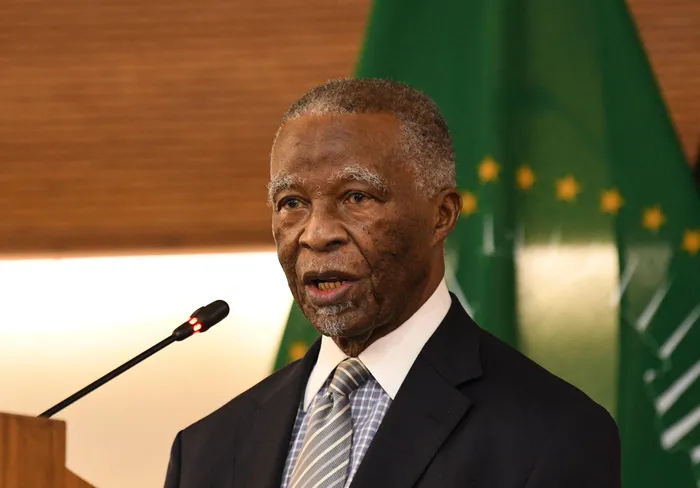Mbeki's intervention in TRC damages litigation criticised as 'absurd' and 'muddying the waters'
FAMILIES SEEK JUSTICE

Former President Thabo Mbeki's application to intervene in an apartheid-era damages claim has been criticised
Image: DIRCO
The Foundation for Human Rights (FHR) has described former president Thabo Mbeki’s application to intervene in the constitutional damages litigation by survivors and families of apartheid-era crime victims as unreasonable and “muddying the waters”.
The application by Mbeki and his former justice minister, Brigitte Mabandla, is set to be heard on Monday, July 28, in the Pretoria High Court.
The families of victims who were forcibly disappeared or killed during apartheid, supported by the foundation, filed an application against President Cyril Ramaphosa and the government early this year, seeking R167-million in constitutional damages for the state’s “gross failure”. They say there was “a gross violation of their human rights as the state failed to investigate and/or prosecute the cases referred by the Truth and Reconciliation Commission to the National Prosecutions Authority”.
They alleged that there was some political interference in the cases, leading to delays of about 15 years.
Speaking to eNCA on Thursday, FHR executive director Zaid Kimmie said they were not gunning for any individual or “alleging that any particular individual was responsible”. He said they were seeking justice and the R167 million damages, and wanted to know “potentially how this interference happened”.
Those seeking to clear their names or “cast aspersions on others” would have their opportunity in the upcoming commission of inquiry set up by Ramaphosa, said Kimmie. He said they believed that the commission was “the correct avenue” that Mbeki and Mabandla should follow. He said the two politicians’ intervention in the damages case was “absurd” and posed a danger of muddying the waters.
“It’s clear to us and all families that there was some form of interference in these cases. You don’t simply have a 15-year delay in investigations and prosecutions because someone forgot to do their job. It’s very clear that there was some sort of interference, and what we’ve asked for was that, to get to the bottom of that interference we need a commission of inquiry,” said Kimmie.
He explained that the R167 million the families were seeking was carefully calculated based on the money used in supporting some of the families during inquests, investigations, prosecutions, and generally providing justice to them.
“Just to make it clear, the money that we’re asking for is going to be held in trust. It will be available to any family who’s in the same situation (as those in the damages case),” he said.
Responding to a question about the “unfinished business of the TRC” and whether, in his view, the state dealt with the issues adequately, Kimmie said: “It’s clear that there has been a gross violation of the human rights of these families. The state didn’t do its job, did not live up to its obligations. And when the state does not live up to its obligations, then it’s incumbent upon the people involved to call them to account …
“It’s simply not enough to say ‘well, bad things happened, these things happen’, and everyone walks away.”
The state had “constitutional, legal obligations” and had officials paid to do their jobs, to investigate and prosecute cases. He said it was “absurd” for them to “simply decide” that a certain set of cases was “not worthy” to be prosecuted.
There have been allegations in the past that interference by the government under Mbeki during former national director of public prosecutions Vusi Pikoli led to work on the case being stopped. There have not been any proper explanation as to why the TRC cases where amnesty was not granted were not pursued.
These cases include the killing of the Cradock Four — Matthew Goniwe, Fort Calata, Sparrow Mkonto, and Sicelo Mhlauli — members of the United Democratic Front and other community organisations fighting apartheid whose killings shocked the nation in 1985.
Mbeki and Mabandla deny that political interference stopped the TRC cases and claim that the application is defamatory of them.
The families oppose their application, arguing that they couldn’t intervene simply to rebut adverse allegations. They say the damages and other relief they seek are “not directed” against Mbeki or Mabandla but against the state; and if they feel they are or might be defamed they have recourse through “normal legal remedies”.
“The families assert that the application can be decided without the need to make findings in respect of individual roleplayers, which will be the task of the commission of inquiry already established by the President, although it is yet to commence its work,” the FHR said in a statement on Thursday.
Related Topics: